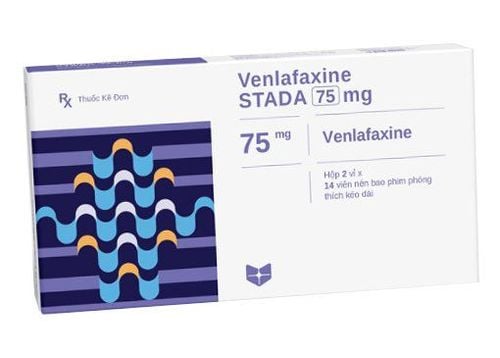This is an automatically translated article.
Healthy food has the ability to help people improve their mood. Therefore, to improve the spirit and quality of work, it is best to add foods to help the spirit to be more alert and excited. So what to eat to relieve stress?
1. Fatty fish
Omega-3 fatty acids are essential fats that the body cannot synthesize on its own. It can only be supplemented through eating foods rich in omega-3s, typically salmon and tuna.
Fatty fish is a good food for people with depression. Two types of omega-3s found in fish oil, DHA and EPA, have been shown to reduce the risk of depression. This type of fat also works to increase the fluidity of brain cell membranes, helping to develop intelligence and cell signaling.
2. Dark Chocolate
Dark chocolate is a compound containing caffeine, theobromine and N-acylethanolamine, which is said to have the effect of improving human mood, suitable as a food for people with stress; although there is still controversy about the potential for psychostimulant when insufficient concentrations are suspected. Dark chocolate also contains flavonoids, compounds that help increase blood flow to the brain, reduce inflammation, and boost brain function, all of which aid in mood regulation.
Finally, the taste of dark chocolate ranks among the most tantalizing foods, which can also help improve mood.

Sôcôla đen hỗ trợ điều chỉnh tâm trạng
3. Fermented foods
Most fermented foods improve mood and intestinal function. However, there are a few that do not provide the important probiotics found in foods such as beer, wine, and some breads.
Fermentation allows live bacteria to thrive in foods that help convert sugars into alcohols and acids, which in turn create probiotics. They are delivered into the intestinal tract which promotes the growth of beneficial bacteria and increases serotonin levels.
Serotonin is a neurotransmitter that affects human behavior, such as mood, stress response, appetite, and sex drive. Up to 90% of serotonin is produced by the gut microbiota. Therefore, probiotics can work as a good food for people with depression.
In addition, fermented foods also play an important role in maintaining brain function. Several studies have demonstrated a link between beneficial gut bacteria in reducing rates of depression. However, more research is still needed to understand how probiotics may regulate mood.
4. Bananas
Bananas are high in vitamin B6, which helps synthesize good neurotransmitters like dopamine and serotonin.
Furthermore, one large banana (136 grams) is capable of providing 16 grams of sugar and 3.5 grams of fiber. When combined with fiber, sugar is released slowly into the bloodstream, thereby keeping blood sugar stable for better mood control. When blood sugar is too low, the body will feel uncomfortable and emotional.
Finally, green bananas provide many beneficial bacteria for the body, the fiber in bananas helps nourish beneficial bacteria in the intestinal tract. A healthy gut microbiome will contribute to a lower incidence of emotional disturbances.

Vitamin B6 trong chuối giúp tổng hợp các chất dẫn truyền thần kinh tốt
5. Oats
Oats are a whole grain that helps improve mood in the morning. They are offered in a variety of products, with the most popular being overnight oats, oatmeal, muesli and granola.
Oats are an excellent source of fiber, providing 8 grams in one cup of whole oats. Fiber helps slow the digestion of carbs, helping to release sugar into the bloodstream slowly to keep energy levels steady.
In one study, people who ate 1.5 - 6 grams of fiber at breakfast had better mood and energy levels. This is thought to be because eating oats in the morning helps stabilize blood sugar, a factor in controlling hot flashes and mood swings.
In addition, oats are also high in iron, 1 cup (81 grams) provides 19% of the daily iron requirement. This shows that oats help people with iron deficiency anemia, reducing disease symptoms such as fatigue, lethargy and mood disorders.
6. Berries
Eating more fruits and vegetables is associated with a reduced incidence of depression. This is attributed to the wide range of antioxidants and phenolic compounds found in berries, which play a key role in fighting oxidative stress - an imbalance of harmful compounds in the body.
Berries are especially high in anthocyanins, pigments found in some berries that have a purple-blue color. Studies have shown that a diet rich in anthocyanins reduces the risk of depression by 39%.

Quả mọng giúp làm giảm nguy cơ mắc bệnh trầm cảm.
7. Nuts and seeds
Nuts and seeds are packed with plant-based protein, healthy fats, and fiber. In addition, they provide tryptophan, an amino acid responsible for the production of serotonin that increases feelings of positivity. Almonds, cashews, peanuts and walnuts, pumpkin, sesame and sunflower seeds, are excellent sources.
Furthermore, nuts and seeds are a big part of the MIND and Mediterranean diets, helping to support a healthy brain. These are diets that encourage the use of fresh, whole foods and limit the amount of processed foods.
Finally, some nuts and seeds, such as Brazilian cashews, almonds and pine nuts, are good sources of zinc and selenium. A deficiency in these minerals may increase your risk of developing depression – although more research is needed to prove it.
8. Coffee
Coffee contains caffeine, a natural compound that prevents adenosine from attaching to brain receptors (the cause is increased feeling of fatigue), thereby increasing the feeling of alertness and concentration. What's more, coffee helps release mood-boosting neurotransmitters, such as dopamine and norepinephrine. One study in 72 people found that both caffeinated and decaffeinated coffee significantly improved mood compared to placebo drinks, suggesting that coffee may also contain other compounds that help improve mood. human mood.

Cà phê là có chứa chất caffeine làm tăng sự tỉnh táo
9. Beans and lentils
Beans and lentils are a great source of B vitamins, which improve mood by increasing levels of neurotransmitters like serotonin, dopamine, norepinephrine and gamma aminobutyric acid (GABA).
Furthermore, B vitamins play a key role in the transmission of nerve signals, allowing for proper connection between neurons. Low levels of these vitamins, especially vitamin B12 and folate, have been linked to mood disorders, such as depression.
Finally, they're also a good source of trace elements like zinc, magnesium, selenium, and non-heme iron, which can help lift spirits.
Healthy food has the ability to help people improve their mood. Therefore, to improve the spirit and quality of work, you should supplement the above foods, which are both good for health and improve mental efficiency.
Reference source: healthline.com













